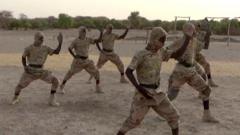In a significant move, the US plans to take the Syrian Islamist group Hayat Tahrir al-Sham (HTS) off its foreign terrorist organizations list, heralding a potential realignment of international relations regarding Syria, which has struggled under extensive sanctions and conflict.
US Set to Remove HTS from Terror List, Signaling Major Shift in Syria's Political Landscape

US Set to Remove HTS from Terror List, Signaling Major Shift in Syria's Political Landscape
The United States prepares to delist Hayat Tahrir al-Sham, potentially altering diplomatic relations in Syria.
In a state department memo, it was reported that the US will officially remove HTS from its terrorist list on Tuesday. HTS, known previously as al-Nusra Front, played a pivotal role in a December offensive that led to the ousting of the long-standing Assad regime—ousted after 54 years in power. Following this upheaval, HTS's leader, Ahmed al-Sharaa, has emerged as the interim president of Syria.
Originally affiliated with al-Qaeda, HTS severed ties with the group in 2016, marking a critical shift in its operational approach. In recent months, Western nations have shown signs of wanting to reset their dealings with Syria. This shift in attitude follows President Trump signing an executive order aimed at expunging US sanctions against the region, intending to facilitate a smoother path towards stability and peace.
In light of these developments, Syrian Foreign Minister Asaad al-Shibani stated that the decision would "lift the obstacle" to economic revival and foster their reintegration into the international community. Reports indicate that negotiations are underway for Syria to revisit a 1974 disengagement agreement with Israel.
Significant diplomatic missions are resuming, as exemplified by UK Foreign Secretary David Lammy's recent visit—his first ministerial visit to Syria since the uprising in 2011. Lammy's meeting with al-Sharaa led to the announcement of an additional £94.5 million support package aimed at fostering longer-term recovery and assisting Syrian refugees, coinciding with the UK's earlier decision to lift sanctions on Syria's defense and interior ministries.
Despite the optimistic outlook from al-Sharaa, concerns linger in Syria around the government’s operation given its historical context, including a striking lack of female representation within the new cabinet and an increase in violent attacks against minority groups. Recent months have seen tragic incidents where clashes involving security forces have led to significant civilian casualties, raising alarm over the stability of the newly established government.
With the international community's eye on Syria, the next steps taken by the interim government will play a crucial role in determining the nation's recovery trajectory amidst the turbulent backdrop of its recent political history.
Originally affiliated with al-Qaeda, HTS severed ties with the group in 2016, marking a critical shift in its operational approach. In recent months, Western nations have shown signs of wanting to reset their dealings with Syria. This shift in attitude follows President Trump signing an executive order aimed at expunging US sanctions against the region, intending to facilitate a smoother path towards stability and peace.
In light of these developments, Syrian Foreign Minister Asaad al-Shibani stated that the decision would "lift the obstacle" to economic revival and foster their reintegration into the international community. Reports indicate that negotiations are underway for Syria to revisit a 1974 disengagement agreement with Israel.
Significant diplomatic missions are resuming, as exemplified by UK Foreign Secretary David Lammy's recent visit—his first ministerial visit to Syria since the uprising in 2011. Lammy's meeting with al-Sharaa led to the announcement of an additional £94.5 million support package aimed at fostering longer-term recovery and assisting Syrian refugees, coinciding with the UK's earlier decision to lift sanctions on Syria's defense and interior ministries.
Despite the optimistic outlook from al-Sharaa, concerns linger in Syria around the government’s operation given its historical context, including a striking lack of female representation within the new cabinet and an increase in violent attacks against minority groups. Recent months have seen tragic incidents where clashes involving security forces have led to significant civilian casualties, raising alarm over the stability of the newly established government.
With the international community's eye on Syria, the next steps taken by the interim government will play a crucial role in determining the nation's recovery trajectory amidst the turbulent backdrop of its recent political history.



















